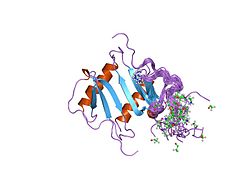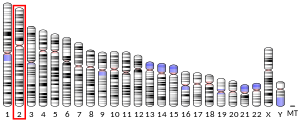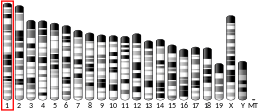Interleukin 8 receptor, alpha is a chemokine receptor. This name and the corresponding gene symbol IL8RA have been replaced by the HGNC approved name C-X-C motif chemokine receptor 1 and the approved symbol CXCR1. It has also been designated as CD181 (cluster of differentiation 181). The IUPHAR Committee on Receptor Nomenclature and Drug Classification use the HGNC recommended name, CXCR1.
Function
editThe protein encoded by this gene is a member of the G-protein-coupled receptor family. This protein is a receptor for interleukin 8 (IL8). It binds to IL8 with high affinity, and transduces the signal through a G-protein-activated second messenger system. Knockout studies in mice suggested that this protein inhibits embryonic oligodendrocyte precursor migration in developing spinal cord. IL8RA, IL8RB, which encodes another high affinity IL8 receptor, and IL8RBP, a pseudogene of IL8RB, form a gene cluster in a region mapped to chromosome 2q33-q36.[5] Stimulation of CXCR1 in neutrophils by its primary ligand, Interleukin 8, leads to neutrophil chemotaxis and activation.[6]
Clinical significance
editBlocking CXCR1 (e.g., with repertaxin[7]) inhibits some human breast cancer stem cells (in vitro and in mice).[8]
In malignant melanoma expression of CXCR1 at the cell surface is present, independent of the cancers stage. It is thought to have a role in the cell growth and angiogenesis required for tumour survival. In this way it has been identified as a potential therapeutic target.[9]
CXCR1 can be cleaved and inactivated by Neutrophil Derived Serine Proteases (NSPs), leading to neutrophil dysfunction and impaired bacterial killing in cystic fibrosis lung disease.[10]
Interactions
editInterleukin 8 receptor, alpha has been shown to interact with GNAI2.[11][12]
See also
editReferences
edit- ^ a b c GRCh38: Ensembl release 89: ENSG00000163464 – Ensembl, May 2017
- ^ a b c GRCm38: Ensembl release 89: ENSMUSG00000048480 – Ensembl, May 2017
- ^ "Human PubMed Reference:". National Center for Biotechnology Information, U.S. National Library of Medicine.
- ^ "Mouse PubMed Reference:". National Center for Biotechnology Information, U.S. National Library of Medicine.
- ^ "Entrez Gene: IL8RA interleukin 8 receptor, alpha".
- ^ Bergin DA, Reeves EP, Meleady P, Henry M, McElvaney OJ, Carroll TP, et al. (December 2010). "α-1 Antitrypsin regulates human neutrophil chemotaxis induced by soluble immune complexes and IL-8". The Journal of Clinical Investigation. 120 (12): 4236–4250. doi:10.1172/JCI41196. PMC 2993580. PMID 21060150.
- ^ Casilli F, Bianchini A, Gloaguen I, Biordi L, Alesse E, Festuccia C, et al. (February 2005). "Inhibition of interleukin-8 (CXCL8/IL-8) responses by repertaxin, a new inhibitor of the chemokine receptors CXCR1 and CXCR2". Biochemical Pharmacology. 69 (3): 385–394. doi:10.1016/j.bcp.2004.10.007. PMID 15652230.
- ^ Ginestier C, Liu S, Diebel ME, Korkaya H, Luo M, Brown M, et al. (February 2010). "CXCR1 blockade selectively targets human breast cancer stem cells in vitro and in xenografts". The Journal of Clinical Investigation. 120 (2): 485–497. doi:10.1172/JCI39397. PMC 2810075. PMID 20051626.
- "Investigators Find Method to Suppress Breast Cancer Stem Cells". Genetic Engineering & Biotechnology News. January 5, 2010. Archived from the original on 2012-08-06.
- ^ Sharma B, Singh S, Varney ML, Singh RK (April 2010). "Targeting CXCR1/CXCR2 receptor antagonism in malignant melanoma". Expert Opinion on Therapeutic Targets. 14 (4): 435–442. doi:10.1517/14728221003652471. PMC 4229031. PMID 20230195.
- ^ Hartl D, Latzin P, Hordijk P, Marcos V, Rudolph C, Woischnik M, et al. (December 2007). "Cleavage of CXCR1 on neutrophils disables bacterial killing in cystic fibrosis lung disease". Nature Medicine. 13 (12): 1423–1430. doi:10.1038/nm1690. PMID 18059279. S2CID 9594986.
- ^ Damaj BB, McColl SR, Neote K, Songqing N, Ogborn KT, Hébert CA, et al. (October 1996). "Identification of G-protein binding sites of the human interleukin-8 receptors by functional mapping of the intracellular loops". FASEB Journal. 10 (12): 1426–1434. doi:10.1096/fasebj.10.12.8903513. PMID 8903513. S2CID 9744575.
- ^ Damaj BB, McColl SR, Mahana W, Crouch MF, Naccache PH (May 1996). "Physical association of Gi2alpha with interleukin-8 receptors". The Journal of Biological Chemistry. 271 (22): 12783–12789. doi:10.1074/jbc.271.22.12783. PMID 8662698.
Further reading
edit- Ahuja SK, Ozçelik T, Milatovitch A, Francke U, Murphy PM (September 1992). "Molecular evolution of the human interleukin-8 receptor gene cluster". Nature Genetics. 2 (1): 31–36. doi:10.1038/ng0992-31. PMID 1303245. S2CID 19732372.
- Lee J, Horuk R, Rice GC, Bennett GL, Camerato T, Wood WI (August 1992). "Characterization of two high affinity human interleukin-8 receptors". The Journal of Biological Chemistry. 267 (23): 16283–16287. doi:10.1016/S0021-9258(18)41997-7. PMID 1379593.
- Morris SW, Nelson N, Valentine MB, Shapiro DN, Look AT, Kozlosky CJ, et al. (November 1992). "Assignment of the genes encoding human interleukin-8 receptor types 1 and 2 and an interleukin-8 receptor pseudogene to chromosome 2q35". Genomics. 14 (3): 685–691. doi:10.1016/S0888-7543(05)80169-7. PMID 1427896.
- Holmes WE, Lee J, Kuang WJ, Rice GC, Wood WI (September 1991). "Structure and functional expression of a human interleukin-8 receptor". Science. 253 (5025): 1278–1280. Bibcode:1991Sci...253.1278H. doi:10.1126/science.1840701. PMID 1840701.
- Chuntharapai A, Lee J, Hébert CA, Kim KJ (December 1994). "Monoclonal antibodies detect different distribution patterns of IL-8 receptor A and IL-8 receptor B on human peripheral blood leukocytes". Journal of Immunology. 153 (12): 5682–5688. doi:10.4049/jimmunol.153.12.5682. PMID 7527448. S2CID 8872590.
- Chuntharapai A, Kim KJ (September 1995). "Regulation of the expression of IL-8 receptor A/B by IL-8: possible functions of each receptor". Journal of Immunology. 155 (5): 2587–2594. doi:10.4049/jimmunol.155.5.2587. PMID 7650389. S2CID 24746695.
- Morohashi H, Miyawaki T, Nomura H, Kuno K, Murakami S, Matsushima K, et al. (January 1995). "Expression of both types of human interleukin-8 receptors on mature neutrophils, monocytes, and natural killer cells". Journal of Leukocyte Biology. 57 (1): 180–187. doi:10.1002/jlb.57.1.180. PMID 7829970. S2CID 7819367.
- Schönbeck U, Brandt E, Petersen F, Flad HD, Loppnow H (March 1995). "IL-8 specifically binds to endothelial but not to smooth muscle cells". Journal of Immunology. 154 (5): 2375–2383. doi:10.4049/jimmunol.154.5.2375. PMID 7868904. S2CID 31884586.
- Ahuja SK, Shetty A, Tiffany HL, Murphy PM (October 1994). "Comparison of the genomic organization and promoter function for human interleukin-8 receptors A and B". The Journal of Biological Chemistry. 269 (42): 26381–26389. doi:10.1016/S0021-9258(18)47205-5. PMID 7929358.
- Sprenger H, Lloyd AR, Meyer RG, Johnston JA, Kelvin DJ (September 1994). "Genomic structure, characterization, and identification of the promoter of the human IL-8 receptor A gene". Journal of Immunology. 153 (6): 2524–2532. doi:10.4049/jimmunol.153.6.2524. PMID 8077663. S2CID 12014231.
- Schnitzel W, Monschein U, Besemer J (June 1994). "Monomer-dimer equilibria of interleukin-8 and neutrophil-activating peptide 2. Evidence for IL-8 binding as a dimer and oligomer to IL-8 receptor B". Journal of Leukocyte Biology. 55 (6): 763–770. doi:10.1002/jlb.55.6.763. PMID 8195702. S2CID 5948202.
- Wu D, LaRosa GJ, Simon MI (July 1993). "G protein-coupled signal transduction pathways for interleukin-8". Science. 261 (5117): 101–103. Bibcode:1993Sci...261..101W. doi:10.1126/science.8316840. PMID 8316840.
- Sebok K, Woodside D, al-Aoukaty A, Ho AD, Gluck S, Maghazachi AA (February 1993). "IL-8 induces the locomotion of human IL-2-activated natural killer cells. Involvement of a guanine nucleotide binding (Go) protein". Journal of Immunology. 150 (4): 1524–1534. doi:10.4049/jimmunol.150.4.1524. PMID 8381837. S2CID 29083621.
- Cerretti DP, Kozlosky CJ, Vanden Bos T, Nelson N, Gearing DP, Beckmann MP (March 1993). "Molecular characterization of receptors for human interleukin-8, GRO/melanoma growth-stimulatory activity and neutrophil activating peptide-2". Molecular Immunology. 30 (4): 359–367. doi:10.1016/0161-5890(93)90065-J. PMID 8384312.
- Mollereau C, Muscatelli F, Mattei MG, Vassart G, Parmentier M (April 1993). "The high-affinity interleukin 8 receptor gene (IL8RA) maps to the 2q33-q36 region of the human genome: cloning of a pseudogene (IL8RBP) for the low-affinity receptor". Genomics. 16 (1): 248–251. doi:10.1006/geno.1993.1167. PMID 8486366.
- Lloyd A, Modi W, Sprenger H, Cevario S, Oppenheim J, Kelvin D (1993). "Assignment of genes for interleukin-8 receptors (IL8R) A and B to human chromosome band 2q35". Cytogenetics and Cell Genetics. 63 (4): 238–240. doi:10.1159/000133541. PMID 8500355.
- Damaj BB, McColl SR, Mahana W, Crouch MF, Naccache PH (May 1996). "Physical association of Gi2alpha with interleukin-8 receptors". The Journal of Biological Chemistry. 271 (22): 12783–12789. doi:10.1074/jbc.271.22.12783. PMID 8662698.
- Ahuja SK, Murphy PM (August 1996). "The CXC chemokines growth-regulated oncogene (GRO) alpha, GRObeta, GROgamma, neutrophil-activating peptide-2, and epithelial cell-derived neutrophil-activating peptide-78 are potent agonists for the type B, but not the type A, human interleukin-8 receptor". The Journal of Biological Chemistry. 271 (34): 20545–20550. doi:10.1074/jbc.271.34.20545. PMID 8702798.
- Damaj BB, McColl SR, Neote K, Songqing N, Ogborn KT, Hébert CA, et al. (October 1996). "Identification of G-protein binding sites of the human interleukin-8 receptors by functional mapping of the intracellular loops". FASEB Journal. 10 (12): 1426–1434. doi:10.1096/fasebj.10.12.8903513. PMID 8903513. S2CID 9744575.
- Jerva LF, Sullivan G, Lolis E (August 1997). "Functional and receptor binding characterization of recombinant murine macrophage inflammatory protein 2: sequence analysis and mutagenesis identify receptor binding epitopes". Protein Science. 6 (8): 1643–1652. doi:10.1002/pro.5560060805. PMC 2143775. PMID 9260277.
External links
edit- "Chemokine Receptors: CXCR1". IUPHAR Database of Receptors and Ion Channels. International Union of Basic and Clinical Pharmacology. Archived from the original on 2016-03-03. Retrieved 2008-12-03.
This article incorporates text from the United States National Library of Medicine, which is in the public domain.





